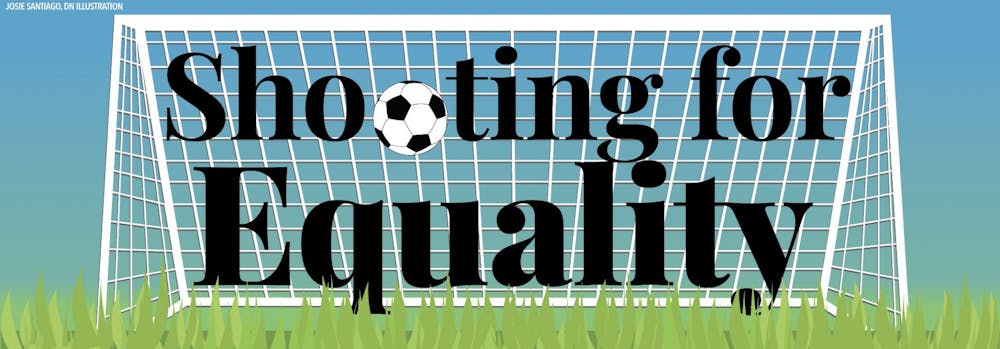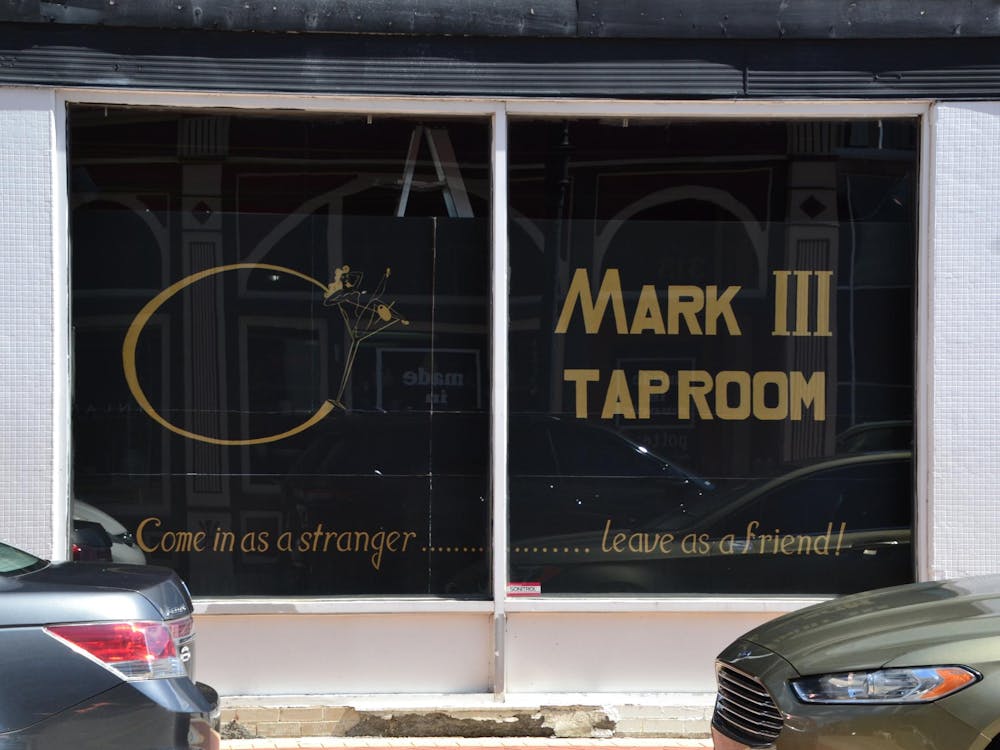Dribble. Aim. Kick.
For the first 18 years of my life, soccer was my sport. I tried softball, volleyball, even choir; but nothing gave me the exhilaration like waking up at 9 a.m., throwing my hair into a ponytail and chasing a ball until the cold wind relieved my sticky skin. There wasn’t a season I didn’t finish ranked as a player on one of the best teams in the league, but I always played with, and against, girls my age.
After my recreational league, Westfield’s Youth Soccer Association (WYSA), created a travel league, called Westfield Select Soccer Club (WSSC) at the time, my parents jumped at the opportunity to sign me up. Travel sports are a different breed of training and competing, but I had been trained for it. Travel leagues have age restrictions for children to travel, but they classify “kiddie” leagues for competitive training that propel children into the varsity teams of their future age brackets. I trained with a travel league named Hoosier F.C. for almost two years while my older sister played for the travel league in the available age brackets that could travel.
The summer before try-outs for WSSC, my mom enlisted the help of my sister’s coach at Hoosier F.C., a former World Cup player, to ensure our spots that fall. After a summer of indoor suicides and water breaks once an hour, I was ecstatic to travel the country to show off my moves.
Then, our practices got moved to the sand pit because the boys’ team needed extra practice time, and the girls’ team was left to move the goals back to the correct lines once the boys had finished. Our travel competitions were in Ohio and Southern Indiana rather than Texas and Florida. I felt like Amanda Bynes from “She’s The Man.” For the first time in my life, I wasn’t the best in my league, because the female teams didn’t get the travel opportunities or tournaments the male teams participated in.
We weren’t even given the chance.
In a broader sense, 28 professional female athletes sued the United States Soccer Federation in 2018 for discriminatory pay after superior performance to the men’s team — who didn’t even qualify for the 2018 FIFA World Cup, while the women’s team had won the cup in 2015. The women’s league won again in 2019 and got their case dismissed by the courts in 2020. It wasn’t until February 2022 that U.S. soccer agreed to pay female athletes in league lump sums back, as well as equal pay to the men’s league going forward. This case helps give women a platform to fight for equality, but as the waterfall trickles down, the strength can get lost in the rocks. Little girls continue to feel the effects of this discrimination without the strength or knowledge to stick up to the men.
Dribble. Aim. Kick.
Coming from a house with two older brothers, both more than a decade older than me, I have never been one to let a man boss me around. From a young age, I learned I can be tiny and powerful at the same time using both my words and actions. I carried that on through school and my travel leagues until I got to high school. I decided after a few years of travel, I wanted to focus on my studies and play recreational soccer again; instead of my high school’s competitive team instead of continuing on with my travel training.
I knew the recreational leagues would be co-ed because there were not enough people signed up to create separate teams by gender, but I never expected to fall in love with it like I did.
I was called the “rock” by my teammates growing up because not even the strongest forward could knock me off my feet. I was a defender, born and bred. I was the last line of defense between a player and the goalie, and I was good at it.
The statement held true for co-ed soccer, but I was not liked as much for it.
At the beginning of the season, the team always had two weeks of practice before the first game. The two weeks of practices before the game my first year were filled with “Why is she a defender?” and “You shouldn't keep her in the whole game.” Comments including “I could get past her with just my speed” and “Why is she down, it doesn’t hurt as bad for a girl” slid off of me the way sweat slid from my forehead.
My head spun as I processed the nasty comments from my male teammates and tried to push past them; physically and mentally. I quickly realized I didn’t care what my dad and brothers told me I was capable of, but I couldn’t shake a man I didn’t know telling me what I could physically do. I processed the half of me that “accidentally” kicked a ball into the privates of a male teammate I hated, and I processed the half of me that squealed in fear every time someone came towering over me, and I came to a definitive conclusion; I had something to prove.
Dribble. Aim. Kick.
In the first game of my first season of co-ed, somehow the slow, short defender ended up with the ball, and because I had something to prove, I wasn’t about to give it up. The crowd of screams roared by as the flat field gained wind. The faces blur past as my elbow collides with a rib and I hear a thud behind me. The familiar voice of a forward breaks through the concentration, “Switch the field! Pass it!”
Dribble. Aim. Kick.
The last defender hit the ground as I approached the goal line and stood face-to-face with the 6-foot-2-inch, 150-pound male goalie. The world stopped as my vision tunneled around the goal, and Kanye West’s “Stronger” began playing in my head. I dribbled forward, tapped the ball to my right and completed the correct flailing motion taught to me by my old summer trainer.
GOAL.
Why do I let men affect my soccer skills when I refuse to listen to the incessant doubts of men outside the white spray paint? I realized these doubts stemmed from the same images that made me think I have to be less than 120 pounds yet curvy to be attractive. Soccer helped force me to realize how valuable silence as an action can be, and helped me find my feminist perspectives early on.
I walked away from that goal knowing I proved I was equal; equal as a defender, equal as a 5-foot-2-inch woman, equal to the men getting up off the ground. I realized then, I had nothing to prove anymore. I began enjoying the sport more, learning to embrace the competition of a forward twice the size of me. Playing co-ed sports was the most fun I have ever had, and I prefer to play with men and women, as long as each player is treated like a team member, not a gender stereotype.
Contact Sophie Nulph with comments at smnulph@bsu.edu or on Twitter @nulphsophie.





